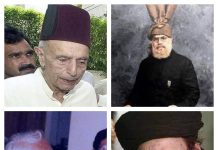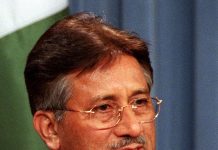By Muhammad Luqman
The special court released its detailed verdict in the high treason case against General (r) Pervez Musharraf on Thursday, wherein it was stated that the former president must be arrested and hanged to death and if he dies before the sentence is executed, his body must be dragged to D Chowk of the federal capital and hanged for three days.
Musharraf was tried in absentia for high treason handed a death sentence under Article-6 of the Constitution on Tuesday. The verdict was split 2-1, with Justice Shahid Karim of the Lahore High Court agreeing with Peshawar High Court Chief Justice Waqar Ahmad Seth and Justice Nazar Akbar of the Sindh High Court dissenting.
The 169-page detailed judgement authored by Peshawar High Court (PHC) Chief Justice Waqar Ahmad Seth stated, “A dictator stays in power only as long as he manages to subvert the will of his people. The usurpation of the functions of government and other organs of State established by the Constitution tantamount to subversion of the Constitution. Exercise of undue influence over judiciary (such as making them cease office and/or take fresh extra-constitutional oath) do tantamount to subversion of the Constitution.
The verdict stated that “as a necessary corollary to what has been observed we find the accused guilty as per charge. The convict be therefore hanged by his neck till he dies on each count as per charge”.
“We direct the Law Enforcement Agencies (LEA) to strive their level best to apprehend the fugitive/convict to ensure that the punishment is inflicted as per law and if found dead, his corpse be dragged to the D-Chowk, Islamabad, Pakistan and be hanged for 03 days,” read the detailed verdict.
Justice Seth, along with Justice Karim, said that the evidence presented had proved that Musharraf committed a crime. Justice Karim concurred with the findings and punishment, with the exception of paragraph 66 which mentions “dragging the body to D-Chowk”. “I dissent with the president […] it has no basis in law and will be ultra vires for this court to do so. In my opinion it is enough to sentence the accused to death,” said Justice Karim.
“Indeed, this portion of the judgement and execution of the sentence is nowhere defined but since it is first impression case and the sentence of death is announced in his absence after declaring the convict as proclaimed offender therefore the sentence is supposed to be executed and in case of his death a sentence, to this extent para 65 prescribes the mode of execution.”
The verdict also stated that Musharraf had “persistently and stubbornly” tried to delay the trial. “The accused facing trial… has persistently and stubbornly strived ever since the commencement of this trial, to delay, retract and in fact evade it. It has been his plea throughout that either on account of ill health or for security hazards he could not reach up to this Court to face trial,” added the judgement.
The judgement also stated that the military officers who were guarding the accused were also accomplices in his deeds. “If for a moment it is presumed that military high command including Corps Commanders were not involved then why they failed to defend and protect the Constitution of the Islamic Republic of Pakistan, 1973 by not restraining a man in uniform […] the then Corps Commanders Committee in addition to all other uniformed officers who were guarding him each and every time, with boots on, are equally and fully involved in the act and deeds of the accused person,” the verdict read.
“The trial of high treason is the requirement of the Constitution against those individuals who undermine or attempt to undermine the Constitution by any means. This court after presentation of undeniable, irrefutable and unimpeachable evidence by the prosecution against the accused reaches to the conclusion that indeed the accused is guilty and deserves exemplary punishment. As a necessary corollary to what has been observed we find the accused guilty as per charge. The convict be hanged by his neck till he dies on each count as per charge,” the verdict added.
The verdict also called for investigation into the ‘criminal acts’ of those who facilitated Musharraf’s escape from the country. “It would be in the interest of justice that all those involved (if any) in facilitation of the escape of the fugitive accused may also be brought in the net of due course of law and their criminal acts (if any) may be investigated and tried in accordance with law,” it read.
Justice Akbar dissented with the opinion of the other judges. He pointed out that the definition of high treason was updated after passage of the 18th constitutional amendment in 2010, which he said was not intended to be applied retrospectively.
“I have respectfully gone through the proposed judgement authored by my brother Waqar Ahmad Seth J […] with my humble comprehension of law and justice, I happened to dissent with majority view of my learned brothers,” he said.
He was of the view that Musharraf’s actions of imposing emergency on November 3, 2007, could not be seen as “attracting provisions of Article 6 of the Constitution” on the said date. “[Counsel] has failed to appreciate that on the date of offence [2007] except ‘abrogate’ and ‘subvert’ no other act of any person was considered as an offence under Article 6 of the Constitution. Only the act of ‘abrogation’ and ‘subversion’ of Constitution was considered as an act of high treason,” he noted.
It is worth mentioning here that the words ‘suspension’ and ‘abeyance’ were not used in the language of Article 6 of the Constitution until April 20, 2010, when they were introduced through the 18th Amendment — almost after two and a half years of Musharraf imposing emergency.
The judgement further ordered to keep the record inclusive of the case properties under lock and key with the registrar of the court till further orders.
The special court’s verdict marks the first time in Pakistan’s history that a military chief has been declared guilty of high treason and handed a death sentence.
Meanwhile, the Director General ISPR, the media wing of armed forces, Maj General Asif Ghafoor has said that Musharraf case’s detailed verdict has proven ‘fears true’
“The fears that were expressed after the special court’s Dec 17 short judgment, those fears are being proven true,” DG ISPR Maj Gen Ghafoor told a news conference in Rawalpindi, the twin city of the capital, Islamabad.
“Our enemies want to enrage us and want us to fight among ourselves,” said the DG ISPR, adding that it won’t be allowed to happen.
He said that anarchy and discord will not be allowed to take place in the country.
“Pakistan Army is not only an institution but a family,” said the army’s spokesman.
“Along with defending our borders, we also know how to defend the honour of our institution,” said the DG ISPR.
“A while ago, the army chief held a detailed discussion with Prime Minister Imran Khan,” said DG ISPR in relation to the verdict.
He said that the army and government are together trying to steer the country towards a conducive direction, free of threats.















